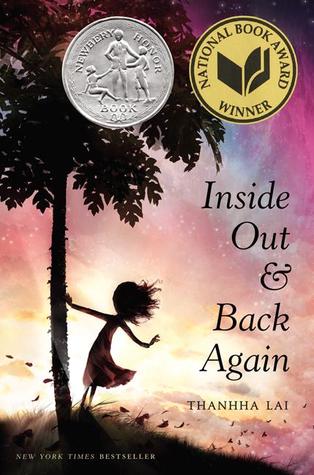 From Goodreads,
From Goodreads,"For all the ten years of her life, Hà has only known Saigon: the thrills of its markets, the joy of its traditions, and the warmth of her friends close by. But now the Vietnam War has reached her home. Hà and her family are forced to flee as Saigon falls, and they board a ship headed toward hope. In America, Hà discovers the foreign world of Alabama: the coldness of its strangers, the dullness of its food . . . and the strength of her very own family."
Goodreads - Inside Out & Back Again
Awards:
- National Book Award for Young People's Literature (2011)
- Newberry Honor (2012)
This book is about Hà and her life in Saigon during the Vietnam War. Her father has been gone for years and every year they pray that he will return or is somewhere safe. As the war progresses Hà and her family decide to flee Saigon and board a boat in hopes of finding a new and better life for them all. After moving, Hà has to learn how to fit in while staying true to who she is.
I read this book in hopes that it would be a good fit for my 4th graders and the book club they wanted to start. This was a very quick read being that it is written in verse. I really liked how real Hà was. Her feelings about moving and about living in a new and foreign place was so genuine and raw. I felt like a lot of kids could connect with her if they had moved around the world or even across the country. A lot of kids know what it is like to be that "new kid" and Hà embodied the "new kid" character well. Her character also gave me some insight into what it is like to be the "new kid", especially since that was something I never experienced while in elementary, middle, or high school.
Something that left me a little unsettled was when the teacher called on Hà to read the alphabet and she did so successfully. The teacher had the class clap and commend her for being able to say the alphabet. I have very mixed feelings about this. Some will think that the teacher underestimated the child and some will say that she was mocking the child by having the class clap. No teacher sets out to humiliate or mock a child. I don't think the clapping was called for, but I also have to remember that this was a totally different time period than now. This part in the book is the prime reason teachers should evaluate and assess a child before having them do any work on a board or reading orally. You don't want to humiliate the child if they can't read, but you don't want to underestimate their abilities either.
I enjoyed this book and how short it was. While it was an excellent book, my 4th graders will not be reading it for book club. I feel like many of the students would lose interest in the book and they would find it boring and the wording difficult. I give this 5 stars and recommend it to anyone looking for a quick read with some historical ties in it.
No comments:
Post a Comment